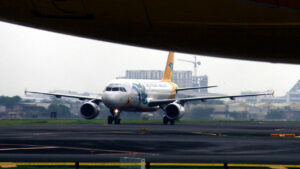Cebu Pacific aims to transition on-ground fleet to e-vehicles

CEBU AIR, Inc., the operator of low-cost carrier Cebu Pacific, has put the full transition of its ground support equipment (GSE) fleet to electric vehicles (EVs) in its long-term goals as it aims for zero carbon emission.
“For us, it’s a long-term goal — [the] full transition of all of our on-ground equipment,” Cebu Pacific Chief Strategy Officer Jose Alejandro B. Reyes said in a chance interview.
Cebu Pacific currently has around 700 pieces of internal combustion engine GSE that are being used throughout its network, said Mr. Reyes.
“Medyo matagal ‘yung transition (The transition will be slow) because some equipment was just bought recently and some are still useful. But our target is to do the easier ones first which have a high impact,” he said.
In November, the company ran the pilot test of its community-optimized managed electric transport, which it plans to use for its 25-passenger buses in Metro Manila.
“We’re doing the experiment now. We are learning from the trial period and when the trial period ends, we will come back and study our learnings on how we will operate them and its charging cycles,” Mr. Reyes said.
The buses have two uses: as service for Cebu Pacific employees and as passenger transport inside the airport. They serve employees in three routes, which are to and from Parañaque, Cubao, and Pasig. The buses that operate inside the airport bring passengers from the terminal to the aircraft.
“That’s what we are trying to work on and make sure it is efficient, optimal, it is right for the passengers and actually reducing carbon emissions,” Mr. Reyes said.
For its air fleet, Cebu Pacific is targeting to operate an all-new-engine-option (NEO) fleet by 2028.
In 2022, the carrier added five fuel-efficient NEO aircraft to its fleet, while it expects the delivery of 11 NEO aircraft in 2023. Three of the 11 NEO aircraft will be 320neo, four will be 321neo and four are 330neo.
The 11 aircraft are expected to cost around $2 billion with 2018 price quotes showing A320neo at around $110.6 million, A321neo at $129.5 million, and A330neo at least $259.9 million. — Justine Irish D. Tabile




